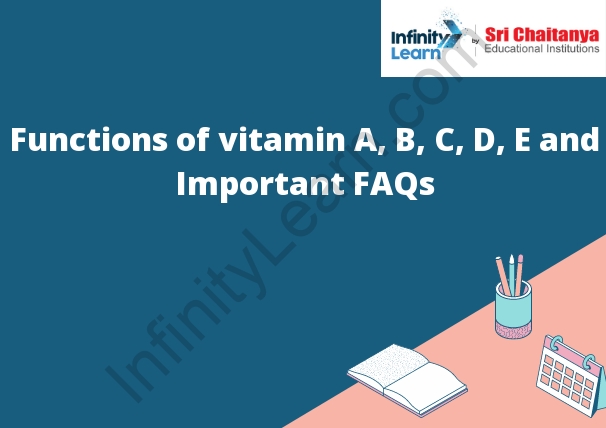Table of Contents
functions-of-vitamin-a-b-c-d-e
Some functions of vitamins A, B, C, D, and E include:
-A: Promotes healthy skin, hair, and nails, and helps maintain a healthy immune system.
-B: Supports energy production, nervous system health, and healthy skin.
-C: Helps maintain a healthy immune system and supports collagen production for healthy skin and connective tissues.
-D: Supports bone health and immune system function.
-E: Supports cardiovascular health, cognitive function, and eye health.

Vitamin A
is a water soluble vitamin that is found in many foods including fruits, vegetables, meat, and dairy products. It is important for good vision, especially in low light, and for the growth and development of bones, teeth, and skin. Vitamin A is also known as retinol because it is one of the ingredients in the eye pigment called retinal.
: Vitamin A is a water soluble vitamin that is found in many foods including fruits, vegetables, meat, and dairy products. It is important for good vision, especially in low light, and for the growth and development of bones, teeth, and skin. Vitamin A is also known as retinol because it is one of the ingredients in the eye pigment called retinal.
How it works: Vitamin A is converted into a hormone called retinoic acid, which is involved in the growth and development of all cells in the body.
Vitamin B
12 is a water soluble vitamin that is mainly found in animal products. It is important for the development and maintenance of red blood cells, nerve cells and other cells in the body. Deficiency of vitamin B12 can lead to anemia, nerve damage, and other health problems.
: Vitamin B12 is a water soluble vitamin that is mainly found in animal products. It is important for the development and maintenance of red blood cells, nerve cells and other cells in the body. Deficiency of vitamin B12 can lead to anemia, nerve damage, and other health problems. Foods rich in vitamin B12 include meat, poultry, fish, eggs, and dairy products. Some plant-based foods, such as seaweed and fermented foods, contain small amounts of vitamin B12, but are not reliable sources of the vitamin.
Vitamin C
is a water soluble vitamin that is found in many fruits and vegetables. It is important for the body to make collagen, a protein that is needed for healthy skin, bones, and cartilage. Vitamin C is also important for the body to fight infection.
: Vitamin C is a water soluble vitamin that is found in many fruits and vegetables. It is important for the body to make collagen, a protein that is needed for healthy skin, bones, and cartilage. Vitamin C is also important for the body to fight infection. What are some benefits of taking vitamin C?
Some benefits of taking vitamin C include healthy skin, bones, and cartilage, and the ability to fight infection.
Vitamin D
is a fat soluble vitamin that is naturally present in very few foods, including fatty fish, liver, and egg yolks. It is also produced when ultraviolet rays from the sun strike the skin and trigger the synthesis of vitamin D. Vitamin D is essential for the absorption of calcium from food and for the maintenance of normal blood levels of calcium and phosphorus.
People who don’t get enough vitamin D may develop a condition called rickets, in which the bones become soft and bend. Vitamin D is also important for healthy teeth because it helps the body use calcium to build strong enamel. Some studies suggest that vitamin D may also play a role in the prevention of cancer, heart disease, and other chronic conditions.
Vitamin E
Vitamin E is a fat-soluble vitamin that is found in many foods, including vegetable oils, nuts, and seeds. It is also available as a dietary supplement.
Vitamin E is a powerful antioxidant that helps protect cells from damage. It also helps maintain healthy skin and hair, and strengthens the immune system.
The body absorbs vitamin E from food better when it is eaten with fat. Vitamin E is stored in the liver and other body tissues.





